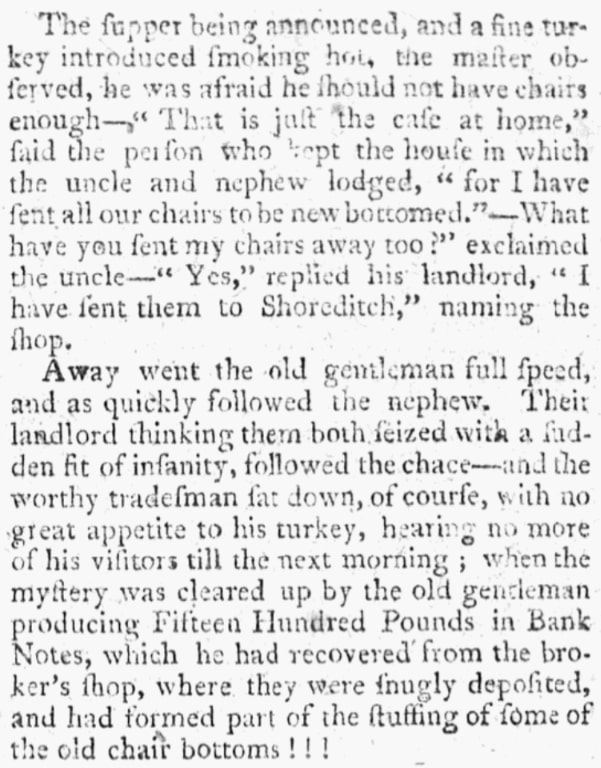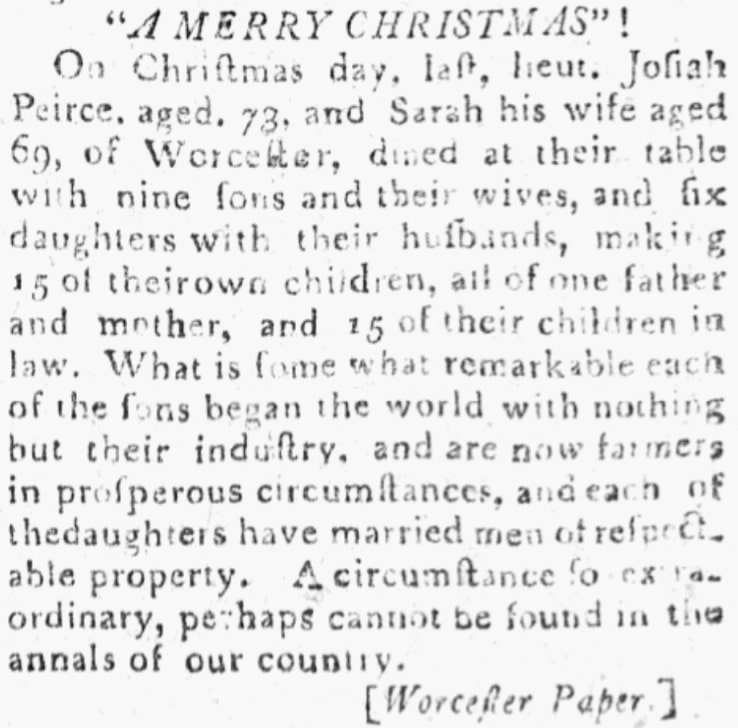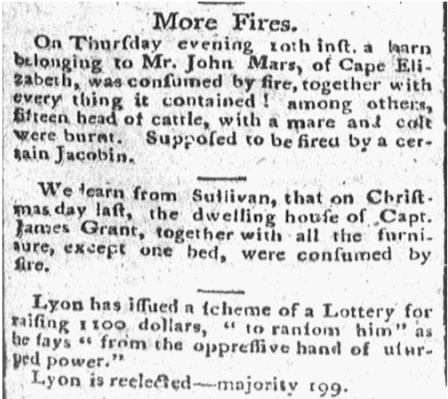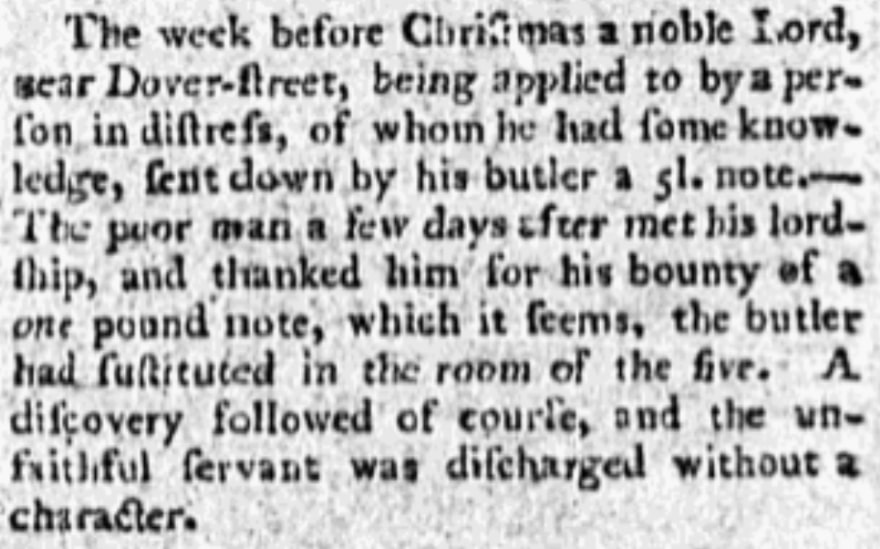Introduction: In this article, Katie Rebecca Merkley tells some funny and touching stories from Christmases past. Katie specializes in U.S. research for family history, enjoys writing and researching, and is developing curricula for teaching children genealogy.
In modern days, friends and family follow each other on social media, where they post about their lives. In this way, people can keep tabs on each other without actually interacting. Our ancestors used newspapers for much the same purpose. Many newspapers, especially in small towns, had gossip columns. In this article, I will examine some Christmas-related, newspaper-posted gossip from the 1790s.

‘A Christmas Tale’: A Dinner Host’s Surprise
The earliest Christmas gossip I found wasn’t posted until May1794, titled “A Christmas Tale.” It tells the story of a tradesman hosting a dinner party the previous Christmas. He casually remarked that he was afraid he wouldn’t have enough chairs, and when one of his guests, a landlord, commented, two other guests suddenly bolted from the dinner party!

This article tells what happened:
The supper being announced, and a fine turkey introduced smoking hot, the master [host] observed, he was afraid he should not have chairs enough. “that is just the case at home,” said the person who kept the house in which the uncle and nephew lodged, “for I havc sent all our chairs to be new-bottomed.” “What, have you sent my chairs away too?” exclaimed the uncle. “Yes,” replied his landlord, “I have sent them to Shoreditch,” naming the shop.
Away went the old gentleman full speed, and as quickly followed the nephew. Their landlord, thinking them both seized with a sudden fit of insanity, followed the chase – and the worthy tradesman sat down, of course, with no great appetite, to his turkey, hearing no more of his visitors till the next morning; when the mystery was cleared up by the old gentleman producing fifteen hundred pounds in bank notes, which he had recovered from the broker’s shop, where they were snugly deposited, and had formed part of the stuffing of some of the old chair bottoms!!!
Before FDIC insurance was even thought about, our ancestors must have supposed furniture a safer place to stash their life savings than in a bank. The uncle in this story must have thought so, but was proven wrong when the chairs were sent away. At least he was able to reclaim his fortune.
A ‘Respectable Individual’ and His Bounty
A Philadelphia paper reported shortly after New Year’s about the “unfortunate tenants of the prison in Boston” and the feast they received on Christmas Day.

This article reports:
On Christmas day, the unfortunate tenants of the prison in Boston were feasted on all the dainties the markets afford, or heart could desire, through the bounty of a respectable individual, who often “does good, and blushes to find it fames [makes him famous].”
A Family’s Christmas Celebration Goes Viral
A report about Josiah Pierce of Worcester, Massachusetts, and his wife Sarah had “gone viral.” The same article was published in several newspapers. It was first posted in a Worcester paper, then on 21 January 1796 in a Leominster, Massachusetts, newspaper. It was posted again two days later in New York City. It was probably posted in other newspapers as well.
Long before the repost and the share buttons of social media were invented, newspaper editors would subscribe to other newspapers and reprint articles they liked. This was how things went viral in our ancestors’ day.

What was so exciting about Josiah and Sarah Pierce’s Christmas that multiple newspaper editors saw fit to repost their story? Josiah was 73, and Sarah was 69, both old for their day. The article outlines how they had Christmas dinner with their nine sons, six daughters, and all their spouses. It then continued by talking about how each of the sons was successful in life and how the daughters had married well. (That was a woman’s measure of success until recently.)
An important thing to point out about that time period is that having a lot of children wasn’t uncommon. What was uncommon was all the children living to adulthood because child mortality rates were high. It can be surmised that this family was in good health, whether from genetic disposition or healthy lifestyle practices. As the unknown author of the article concludes:
“A circumstance so extraordinary cannot be found in the annals of our country.”
Christmas Fires – and an Editor’s Sarcasm
A Massachusetts newspaper reported a fire that occurred on Christmas Day. Captain James Grant lost his dwelling house and all his furniture except one bed to fire. This was part of a column titled “More Fires,” which also reported the burning of a barn belonging to Mr. John Mars. The other notice in this column must have been a political jibe at a politician named Lyons. He had issued what the editor called a “scheme of a lottery” that apparently was successful, for he was reelected. The fact that the newspaper editor listed that under “More Fires” implies his opinion on the matter.

A Generous Nobleman – and a Dishonest Butler
Christmas in July in modern times is often used as an excuse to watch Hallmark Christmas movies in the summer. In 1799, this was a time for newspaper posts about what happened overseas at Christmas time to go viral. The following article was taken from London papers and published in early July in Philadelphia, New York, and elsewhere.

In this story, a nobleman sent a five-pound note the week before Christmas to “a person in distress” through his butler, then found out the butler sent a one-pound note instead. The butler was discharged “without a character,” which would make it harder for him to find his next job. This story is about a noble lord doing good and a dishonest person being punished. Is it any wonder why it was so popular?
Our ancestors were much like us in wanting to know what was going on in the world. We have methods of doing so that weren’t around in their days. Reading our ancestors’ newspapers, like the ones discussed above, can help us see what their world was like.
Explore over 330 years of newspapers and historical records in GenealogyBank. Discover your family story! Start a 7-Day Free Trial
Note on the header image: “The Christmas Tree” by Albert Chevallier Tayler, 1911. Credit: Wikimedia Commons.
